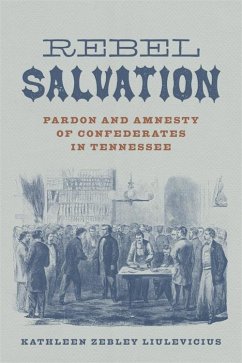Winner of the Tennessee History Book Award
In Rebel Salvation, Kathleen Zebley Liulevicius examines pardon petitions from former Confederate soldiers and sympathizers in Tennessee to craft a unique and comprehensive analysis of the process of Reconstruction in the Volunteer State after the Civil War. These underutilized petitions contain a wealth of information about Tennesseans from an array of social and economic backgrounds, and include details about many residents who would otherwise not appear in the historical record. They reveal the dynamics at work between multiple factions in the state: former Rebels, Unionists, Governor William G. Brownlow, and the U.S. Army officers responsible for ushering Tennessee back into the Union. The pardons also illuminate the reality of the politically and emotionally charged post-Civil War environment, where everyone-from wealthy elites to impoverished sharecroppers-who had fought, supported, or expressed sympathy for the Confederacy was required by law to sue for pardon to reclaim certain privileges. All such requests arrived at the desk of President Andrew Johnson, who ultimately determined which petitioners regained the right to vote, hold office, practice law, operate a business, and buy and sell land.
Those individuals filing petitions experienced Reconstruction in personal and profound ways. Supplicants wrote and circulated their exoneration documents among loyalist neighbors, friends, and Union officers to obtain favorable endorsements that might persuade Brownlow and Johnson to grant pardon. Former Rebels relayed narratives about the motivating factors compelling them to side with the Confederacy, chronicled their actions during the war, expressed repentance, and pledged allegiance to the United States government and the Constitution. Although not required, many petitioners even sought recommendations from their former wartime foes.
The pardoning of former Confederates proved a collaborative process in which neighbors, acquaintances, and erstwhile enemies lodged formal pleas to grant or deny clemency from state and federal officials. Indeed, as Rebel Salvation reveals, the long road to peace began here in the newly reunited communities of postwar Tennessee.
In Rebel Salvation, Kathleen Zebley Liulevicius examines pardon petitions from former Confederate soldiers and sympathizers in Tennessee to craft a unique and comprehensive analysis of the process of Reconstruction in the Volunteer State after the Civil War. These underutilized petitions contain a wealth of information about Tennesseans from an array of social and economic backgrounds, and include details about many residents who would otherwise not appear in the historical record. They reveal the dynamics at work between multiple factions in the state: former Rebels, Unionists, Governor William G. Brownlow, and the U.S. Army officers responsible for ushering Tennessee back into the Union. The pardons also illuminate the reality of the politically and emotionally charged post-Civil War environment, where everyone-from wealthy elites to impoverished sharecroppers-who had fought, supported, or expressed sympathy for the Confederacy was required by law to sue for pardon to reclaim certain privileges. All such requests arrived at the desk of President Andrew Johnson, who ultimately determined which petitioners regained the right to vote, hold office, practice law, operate a business, and buy and sell land.
Those individuals filing petitions experienced Reconstruction in personal and profound ways. Supplicants wrote and circulated their exoneration documents among loyalist neighbors, friends, and Union officers to obtain favorable endorsements that might persuade Brownlow and Johnson to grant pardon. Former Rebels relayed narratives about the motivating factors compelling them to side with the Confederacy, chronicled their actions during the war, expressed repentance, and pledged allegiance to the United States government and the Constitution. Although not required, many petitioners even sought recommendations from their former wartime foes.
The pardoning of former Confederates proved a collaborative process in which neighbors, acquaintances, and erstwhile enemies lodged formal pleas to grant or deny clemency from state and federal officials. Indeed, as Rebel Salvation reveals, the long road to peace began here in the newly reunited communities of postwar Tennessee.
Dieser Download kann aus rechtlichen Gründen nur mit Rechnungsadresse in A, D ausgeliefert werden.









